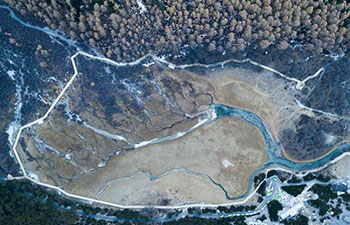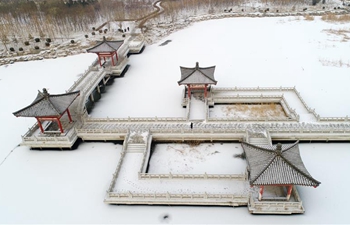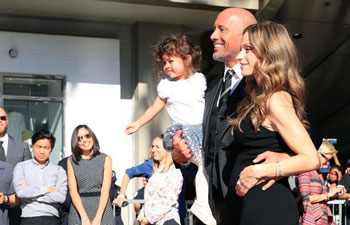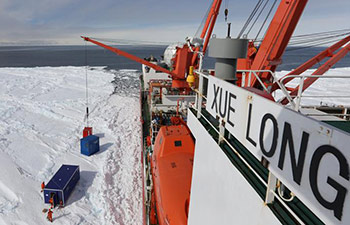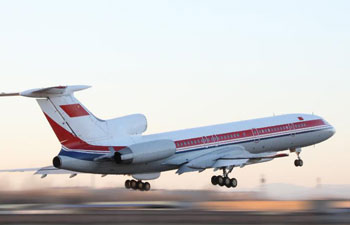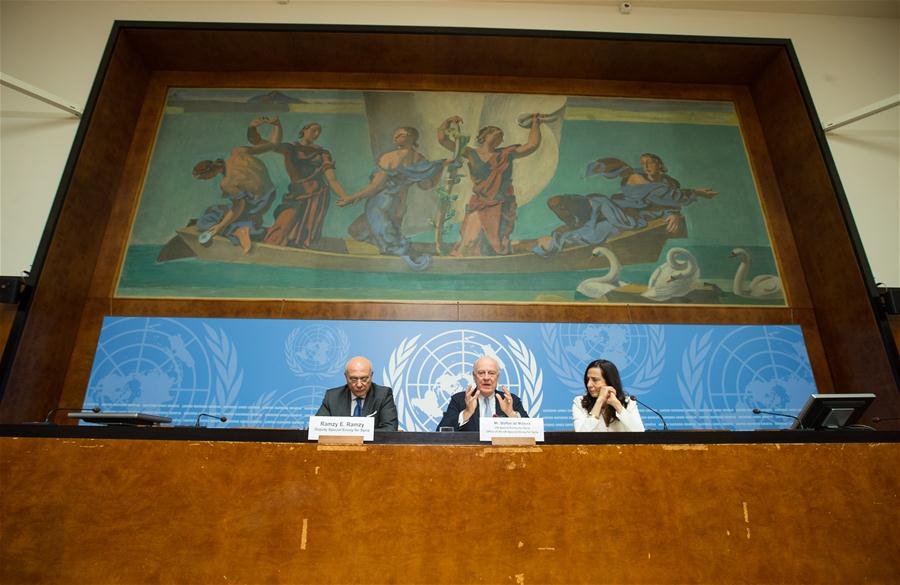
The UN Special Envoy for Syria Staffan de Mistura (C) speaks at a press conference in Geneva, Switzerland, on Dec. 14, 2017. Staffan de Mistura said that the way Intra-Syrian peace talks proceed will come after he speaks to the Security Council in New York as the eighth round ended Thursday without "real negotiations." (Xinhua/Xu Jinquan)
DAMASCUS, Dec. 14 (Xinhua) -- As expected, the eighth round of the intra-Syrian talks in Geneva ended Thursday, with nothing but wrangling, with both negotiating parties holding firm to their visions.
Ahead of the talks, the Saudi-backed Riyadh Platform opposition group renewed demands for President Bashar al-Assad's departure as a prelude to any political settlement, which gave the government delegation a reason to accuse the opposition of placing pre-conditions to the talks, something that had previously been rejected.
The government side, as in previous rounds, wanted to prioritize the counter-terror as the first basket to be discussed during the talks.
The opposition wanted to discuss a transitional period.
The UN special envoy to Syria, Staffan de Mistura, has also had his share of criticism during the talks.
On Thursday, the head of the government delegation, Bashar al-Jafaari, said the UN envoy was undermining his mission as a mediator, after calling on President Vladimir Putin, Syria's main international ally, to pressure Damascus into accepting elections.
Speaking to a Swiss TV on Wednesday, Mistura said Putin can "convince the government that there is no time to lose." He added that failing to do so risks the "fragmentation of Syria."
"You can think you win territory militarily but you have to win the peace ... And to win the peace, you have to have the courage to push the government to accept that there has to be a new constitution and new elections, through the United Nations," the envoy said.
The envoy has also been trying to push both sides into face-to-face negotiations, but the Syrian side refused as long as the opposition delegation kept holding tight to its pre-conditions.
During the days-long talks, pro-government media outlets cited the government delegation as saying that they were not going to Geneva to hand over the rule of Syria to the opposition.
Jafaari, in his remarks to reporters Thursday, said that the government delegation wasn't going to embark on direct talks with the opposition as long as they keep adopting pre-conditions, particularly those related to the presidency of Assad.
For his part, De Mistura said Thursday that the eighth round ended without "real negotiations."
He told journalists at the UN in Geneva that the two weeks of talks failed to yield the intended results despite great efforts, which he described as a "missed golden opportunity."
De Mistura said the scheduled topics of a constitution and elections under UN Security Council Resolution 2254 had not even been discussed with the government delegation.
"We did not see the government looking to have a dialogue in this round," said the UN envoy, adding that "there is no alternative but to have the legitimacy of the UN."
He said as well as reporting back to the UN Security Council in New York, he would also seek advice from special ambassadors of the Permanent Five members of the Security Council who he has been consulting.
Maher Ihsan, a Syrian political analyst, told Xinhua that the opposition pre-conditions made ahead of the talks were the main hurdle in the face of reaching any common ground between both sides.
"They have tried this demand before and they failed to achieve anything, and they renewed this demand now at a time when the government forces retook major areas across Syria," he told Xinhua.
For his side, former U.S. ambassador to Syria, Robert Ford, has warned the opposition delegation in remarks he made to a pro-opposition media outlets.
Ford stressed that Assad will remain in his post for a long time, adding that it's impossible for the opposition to force him to leave.
He added that the opposition has no choice due to the major military defeat of the opposition fighters in Syria.
The opposition has to accept the fact that Assad is staying in his post "even though his continuation (in the rule) would have negative repercussions on us."
Meanwhile, Nasr al-Hariri, the head of the opposition delegation to Geneva, said at the end of the talks that the opposition is committed to the political solution.
"We came to Geneva with the hope and dream of peace," he said, accusing the government delegation of "challenging the international community and scoffing at it."
He said the Geneva talks are at the stake and "the world has to move to salvage it," noting that Russia alone cannot pressure the government into moving forward in the political solution.
Al-Hariri accused the government delegation of refusing to lift the siege imposed on besieged rebel-held areas.
After the failure of this round of talks, eyes are now shifted toward the upcoming talks in Astana brokered by Russia, Iran, and Turkey, observers here say.




